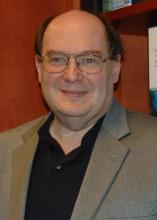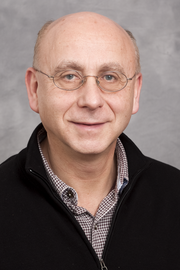The American Association for the Advancement of Science (AAAS), the world’s largest general scientific society and publisher of the journal Science, has recognized two faculty members from the Case Western Reserve University School of Medicine in the class of 2024 AAAS Fellows.
So honored were Jonathan Karn, Distinguished University Professor and chair of the Department of Molecular Biology and Microbiology, and Witold K. Surewicz, the Robert F. Bennett MD Professor in the Department of Physiology and Biophysics.
Since 1874, being elected an AAAS Fellow is a lifetime honor acknowledging professional ethics and scientific integrity.
“This year’s class of Fellows are the embodiment of scientific excellence and service to our communities,” said Sudip S. Parikh, AAAS chief executive officer and executive publisher of the Science family of journals. “At a time when the future of the scientific enterprise in the U.S. and around the world is uncertain, their work demonstrates the value of sustained investment in science and engineering.”
This year’s AAAS Fellows will be announced in the AAAS News & Notes section of Science this month and formally recognized June 7 at the annual meeting in Washington, D.C.
AAAS announced Karn was selected for “distinguished contributions to the field of molecular virology, particularly for studies of HIV transcription and latency in immune cells and the central nervous system,” and Surewicz for “distinguished contributions to the field of biochemistry and biophysics, particularly for advancing the understanding of the mechanism of protein misfolding in prion diseases and other neurodegenerative disorders.”
HIV/AIDS research pioneer
“I knew at a very young age,” Karn said, “that I wanted to do biological science.”
His interest began when he was about eleven years old finding a little pamphlet in the school library called the Vital Wheel, about intermediary metabolism.
“My parents were amused when I read that at a young age because I was writing molecular structures on the blackboard, and they assumed I was just making things up,” he said.
Karn’s deep interest in molecular biology has garnered worldwide acclaim as a pioneer in HIV research—and, especially, in search of a cure. He’s dedicated his career to eliminating or discovering a definitive cure for the virus.
In the late 1980s and early 1990s, he identified why HIV can’t be completely eradicated with antiretroviral drugs and provided insight into how the virus can remain hidden in the body in a dormant state. This breakthrough has been celebrated as a pivotal moment in the early battle against AIDS.
During the COVID-19 pandemic, Karn’s expertise as a virologist was key in leading the response. In April 2020, he co-founded the Cleveland SARS-CoV-2 Task Force, bringing together over 250 academic members from local hospitals and medical centers. The group conducted significant studies on the coronavirus, including identifying critical mutations that could potentially disable it.
“It’s always nice to be recognized,” Karn said of the AAAS honor, “but it’s almost a cliché now…that science isn’t an individual activity. It’s a teamwork activity, and anything my lab has accomplished over the years has been the work of many people. This is certainly a recognition of their efforts as well.”
Neurodegenerative disorders explorer
Surewicz initially pursued theoretical physics during his undergraduate studies at the University of Lodz, Poland. His interest in biology was sparked by the exciting research happening in the field at the time. That led to focusing on understanding the building blocks of proteins, eventually positioning him as a leading figure in the study of neurodegenerative disorders.
In the mid-1980s, the United Kingdom reported the first cases of mad cow disease in cattle. A decade later, the disease had spread to humans, triggering widespread panic and intense interest because of its link to rapidly progressing dementia.
At that time, Surewicz developed an interest in this group of infectious neurodegenerative disorders, now known as prion diseases.
At first, medical researchers thought prion diseases were caused and transmitted by viruses. But studies have since shown the cause to be clumps of an abnormally shaped—or misfolded—proteins accumulating and reproducing in the brain by “recruiting” normal forms of the prion protein.
The finding that the infectious agent can simply be a misfolded protein represented a new pattern in biology and medicine. And Surewicz has played an important role in deciphering the mechanisms by which this germ forms and self-replicates.
Surewicz called the AAAS award “a great honor…It makes me proud, and I’m appreciative of my colleagues who took the time to nominate me as well as my students and post-doctoral fellows who worked in this field for years and contributed to this research.”
Studying rare prion diseases has provided important implications to better understand the mechanisms for other more common neurodegenerative diseases, such as Alzheimer’s disease and frontotemporal dementia. The Surewicz lab also focuses on these.
“Drs. Karn and Surewicz are truly worthy of being named AAAS Fellows,” said School of Medicine Dean Stanton Gerson. “Both focus on two crucial facets of human health that will shape global health advancements in the ensuing decades. One of the foremost authorities on HIV and related illnesses worldwide, Dr. Karn is spearheading research efforts to find a treatment for the virus. Dr. Surewicz investigates neurodegenerative disorders such as Alzheimer’s disease, which impact large segments of aging population and for which there are no known cures.”
For more information, please contact Patty Zamora at patty.zamora29@case.edu.




